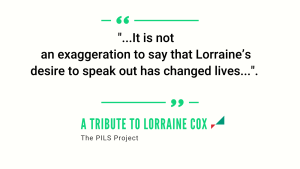Casework
Lorraine Cox
This judicial review challenged the six-month life expectancy rule for terminally ill social security claimants.
PILS Member: Law Centre NI
Legal support through the Pro Bono Register and Litigation Fund financial support to cover costs related to lodging proceedings.
Issue:
In 2020, Lorraine Cox from Fermanagh applied for leave to challenge the legal definition of terminal illness, represented by the legal team from the Law Centre NI. Lorraine was diagnosed with motor neurone disease in 2017 at the age of 37 and had initially been turned down for an enhanced PIP payment because of the six-month life expectancy rule.
Under the Welfare Reform (NI) Order 2015, a person who has made a Personal Independence Payment (PIP) claim on the basis that they are terminally ill will be considered to be terminally ill if they are suffering from a progressive illness and “…the person’s death in consequence of that disease can reasonably be expected within 6 months” (Article 87).
Lorraine’s case challenged the compatibility of the Welfare Reform (NI) Order 2015’s six-month rule and Regulation 2 of the Universal Credit Regulations (NI) 2016 with human rights law (Article 1 Protocol 1 and Article 8 ECHR read alone/in conjunction with Article 14 ECHR).
Lorraine’s legal team contrasted the treatment of terminally ill social security claimants who could not demonstrate their life expectancy was less than 6 months (not entitled to enhanced payment under the Special Rules) with the experience of claimants with terminal illness who subsequently lived beyond their 6-month life expectancy (continued to receive their benefits for three years without needing a review).
The application for judicial review was heard at the High Court in Belfast on 18 and 19 June 2020.
Lorraine Cox's application for leave was being heard at Belfast's High Court today, supported by PILS NGO member @LawCentreNI. Their legal officer @owenmc24 has spoken about how the six month rule hurts claimants who are terminally ill: https://t.co/VhT2353zwd
— The PILS Project (@PILSni) June 18, 2020
On 8 July 2020, the High Court ruled that this difference in treatment was ‘manifestly without reasonable justification’. This was considered to have breached Article 14 of the European Convention of Human Rights in conjunction with Article 8 and Article 1 of Protocol 1.
Delivering the judgment, Mr Justice McAlinden stated [at para. 104] “Upon careful scrutiny of all the evidence, I can find no evidence, justification or rationale to explain why the applicant was not deemed to be entitled to the enhanced rate of PIP for activities of daily living and the standard rate of mobility from the date when her terminal diagnosis was confirmed.”
PILS are proud to have assisted this case through our Pro Bono Register and our Litigation Fund.
Impact:
The Department for Communities, along with the Department for Work and Pensions, appealed the High Court decision in Lorraine’s case.
In June 2021, Department for Communities stated its commitment to extending the life expectancy criterion to 12 months, enabling more people to access benefits under the ‘special rules’.
On 03 August 2021, the Court of Appeal overturned the original 2020 judgment, stating that it was not appropriate for the courts to intervene, as the special rules had been the subject of review by politicians.
However, this didn’t mean that positive change was not possible. The case had already prompted the Department to publicly commit to changing the criteria. On 24 January 2022, The Social Security (Terminal Illness) Bill passed final stage in the NI Assembly, with widespread support from all parties.
It may be a single entry on the @niassembly's order paper for the day, but…
💪it reflects *years* of #Scrap6Months campaigning, led by many people whose lives were limited by illness but who choose to call for legal change.@MarieCurieNI @mndassocNI @MNDA_NI @Craig7Harrison
— The PILS Project (@PILSni) January 24, 2022
Communities minister Deirdre Hargey MLA called the legislation ‘a critical step forward’, one that comes after years of campaigning to scrap the so-called ‘Six Month Rule’ by terminally ill people, their families and multiple NGOs.
The legislation came into effect in April 2022.
Lorraine Cox – the woman whose judicial review shone a spotlight on the reality of life in Northern Ireland for people who have received a terminal illness diagnosis – died on 15 July 2022. The PILS Project were desperately saddened to learn of her untimely death.
